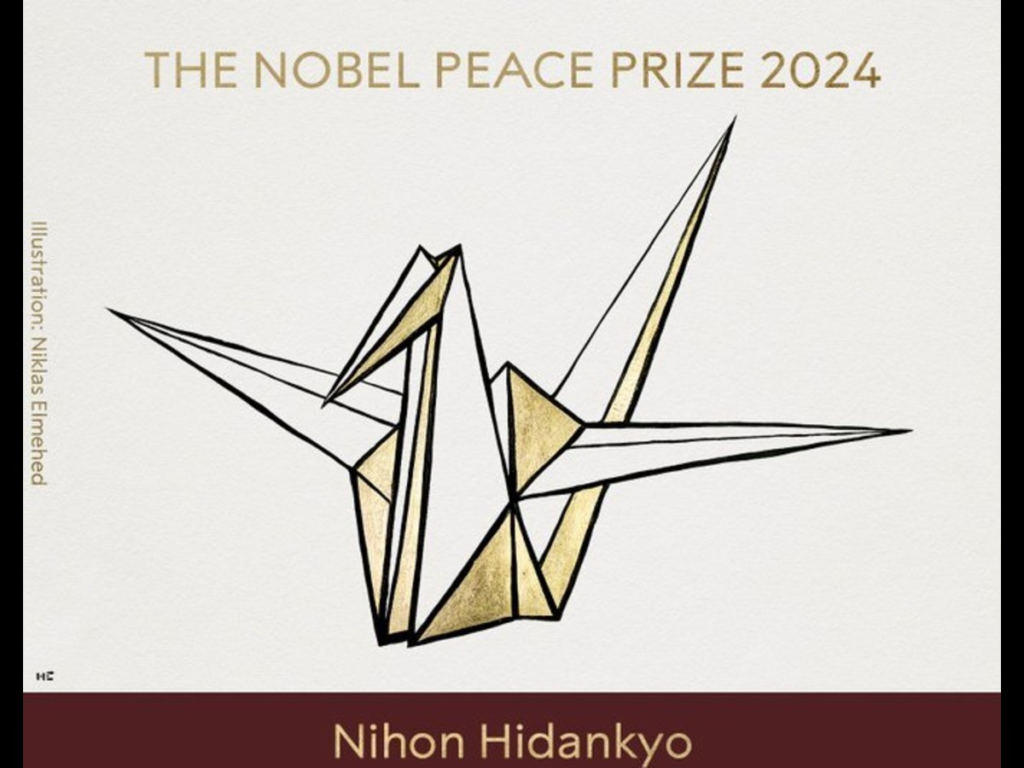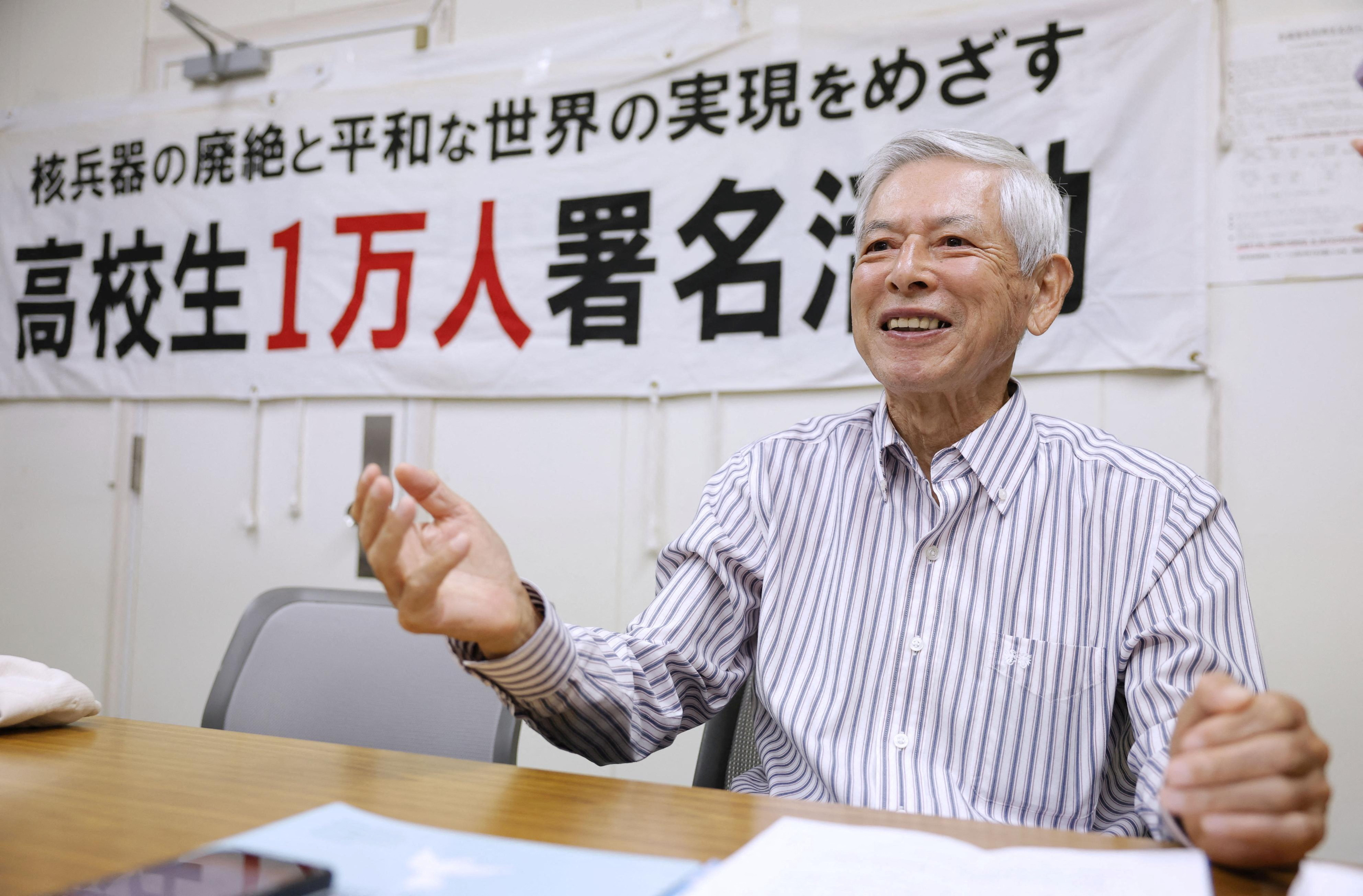In a world still grappling with the dangers of nuclear conflict, the 2024 Nobel Peace Prize has been awarded to Nihon Hidankyo, a Japanese organisation representing the survivors of the atomic bombings of Hiroshima and Nagasaki.
The group’s tireless efforts to raise global awareness about the catastrophic humanitarian consequences of nuclear weapons and their mission to achieve a nuclear-free world have been recognized on the global stage.
This award is a testament to the courage and resilience of the Hibakusha, the survivors who have dedicated their lives to ensuring that the horrors of nuclear warfare are never forgotten.
The Legacy of Hiroshima and Nagasaki: Nihon Hidankyo’s Origins
Nihon Hidankyo, or the Japan Confederation of A- and H-Bomb Sufferers Organizations, was formed in 1956, more than a decade after the devastating atomic bombings of Hiroshima and Nagasaki in August 1945. The group has since become the largest and most influential organisation representing atomic bomb survivors in Japan.
Read : South Korean Author Han Kang Wins Nobel Prize in Literature
The mission of Nihon Hidankyo has always been clear: to share the stories of the Hibakusha with the world, to highlight the inhumane consequences of nuclear weapons, and to advocate for complete nuclear disarmament.
Read : 8-Year-Old Pekingese Wild Thang Wins 2024 World’s Ugliest Dog Contest
The bombings of Hiroshima and Nagasaki, which killed an estimated 120,000 people instantly and led to tens of thousands more deaths due to injuries and radiation exposure, left an indelible mark on history. Survivors faced not only physical suffering but also the trauma of witnessing the utter destruction of their cities.
For many years, the Hibakusha lived in silence, struggling with health complications, societal stigma, and the emotional scars of their experience. Nihon Hidankyo gave these survivors a platform, amplifying their voices in a world that needed to hear about the real consequences of nuclear warfare.

Through public appeals, witness testimonies, and international advocacy, Nihon Hidankyo has been at the forefront of shaping the international “nuclear taboo”—the powerful norm that stigmatises the use of nuclear weapons as morally unacceptable. Their message has been clear: no country, no government, no individual should ever unleash the horrors of nuclear weapons again.
The Hibakusha’s Voice: Witness to the Horrors of Nuclear Warfare
One of the most powerful elements of Nihon Hidankyo’s work is the personal testimony of the Hibakusha. The survivors have provided the world with a first-hand understanding of the unimaginable pain and suffering caused by nuclear weapons.
These testimonies have been instrumental in shaping public opinion, influencing policy discussions on nuclear disarmament, and advancing international treaties aimed at preventing the use of nuclear weapons.
The Hibakusha’s stories describe the “indescribable.” Survivors recount scenes of apocalyptic devastation—entire cities reduced to ash, thousands of bodies strewn across the landscape, the stench of death in the air, and the eerie silence that followed the blast.
Those who survived faced years of suffering from burns, radiation sickness, and various forms of cancer. Many Hibakusha lost family members, friends, and entire communities in the blink of an eye.
Over the decades, the Hibakusha have shared their experiences with a world that, in many ways, has struggled to comprehend the scale of the devastation.
Their stories are not just about the past—they are a warning for the future. They speak to the need for global efforts to prevent the use of nuclear weapons and to work toward disarmament.

The Nobel Committee recognized the Hibakusha’s role in bearing witness to the horrors of nuclear warfare, stating, “The Hibakusha help us to describe the indescribable, to think the unthinkable.” The survivors’ willingness to relive their trauma for the sake of global peace is a powerful reminder of the human cost of nuclear weapons.
Nihon Hidankyo’s work has been pivotal in ensuring that the Hibakusha’s voices are heard at international forums, including the United Nations. Each year, delegations from the group attend conferences on disarmament, urging world leaders to take concrete steps toward a nuclear-free world.
Their presence at these events serves as a moral compass, reminding diplomats and policymakers of the human suffering behind abstract discussions of nuclear deterrence and strategic arsenals.
A Global Reminder: The Ongoing Threat of Nuclear Weapons
The Nobel Committee’s decision to award Nihon Hidankyo the 2024 Nobel Peace Prize is a timely reminder that, despite nearly 80 years passing since the bombings of Hiroshima and Nagasaki, nuclear weapons continue to pose a significant threat to global peace. Today, nine nations possess nuclear weapons, with thousands of warheads at their disposal.
While the Cold War arms race may have ended, the nuclear arsenals of the world are being modernised, and tensions between nuclear-armed states are rising.
The war in Ukraine, which began with Russia’s invasion in 2022, has raised fears of nuclear conflict, especially as the rhetoric surrounding nuclear weapons has intensified.
In the Middle East, the escalating violence in Gaza following the outbreak of conflict in October 2023 has led to widespread loss of life, while other regions, such as Sudan, are also embroiled in protracted conflicts. These global crises underscore the fragile nature of peace and the catastrophic potential of nuclear weapons.
In awarding the Nobel Peace Prize to Nihon Hidankyo, the Norwegian Nobel Committee acknowledged the growing threats to global peace. “At this moment in human history, it is worth reminding ourselves what nuclear weapons are: the most destructive weapons the world has ever seen,” the Committee’s statement read.
The Hibakusha’s stories are not relics of the past; they are warnings for the present and the future. The continued existence of nuclear weapons means that the horrors of Hiroshima and Nagasaki could be repeated. As tensions between nuclear-armed nations increase, the risk of accidental or intentional use of these weapons grows.
The Nobel Committee’s decision to honor Nihon Hidankyo highlights the urgent need for renewed efforts to prevent nuclear catastrophe and to advance disarmament.
Nihon Hidankyo’s work is particularly relevant as the world approaches the 80th anniversary of the atomic bombings in 2025. This milestone will serve as a moment for reflection on the progress—or lack thereof—toward the elimination of nuclear weapons.

While treaties like the Treaty on the Non-Proliferation of Nuclear Weapons (NPT) and the Treaty on the Prohibition of Nuclear Weapons (TPNW) represent important steps, the road to complete disarmament remains long and fraught with challenges.
The awarding of the 2024 Nobel Peace Prize to Nihon Hidankyo is not just a recognition of the past efforts of the Hibakusha; it is a call to action for the future.
The survivors of Hiroshima and Nagasaki have dedicated their lives to ensuring that the world never forgets the catastrophic consequences of nuclear weapons. Their stories, their pain, and their courage have shaped the global conversation on nuclear disarmament.
As the world faces renewed threats of nuclear conflict, the Hibakusha’s message is more relevant than ever: the only way to guarantee peace is to eliminate nuclear weapons entirely.
Nihon Hidankyo’s Nobel Peace Prize is a reminder that the horrors of nuclear warfare must never be repeated. It is a recognition of the survivors’ suffering, but more importantly, it is an acknowledgment of their determination to turn that suffering into a force for global peace.
In honoring Nihon Hidankyo, the Nobel Committee has given the world a powerful symbol of hope. The Hibakusha’s resilience, their unwavering commitment to peace, and their relentless pursuit of a nuclear-free world serve as a beacon of hope in a time of increasing global instability.
Their message is clear: the future of humanity depends on our ability to learn from the past and to ensure that the horrors of nuclear weapons are never unleashed again.

